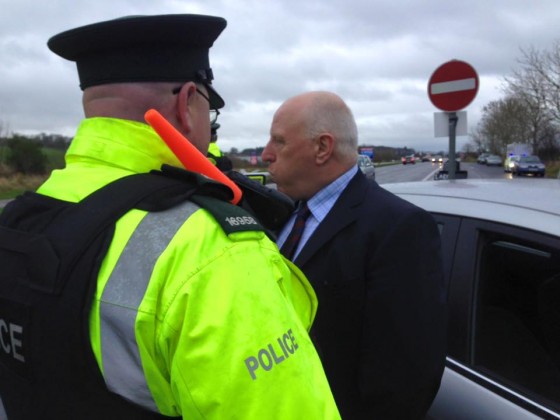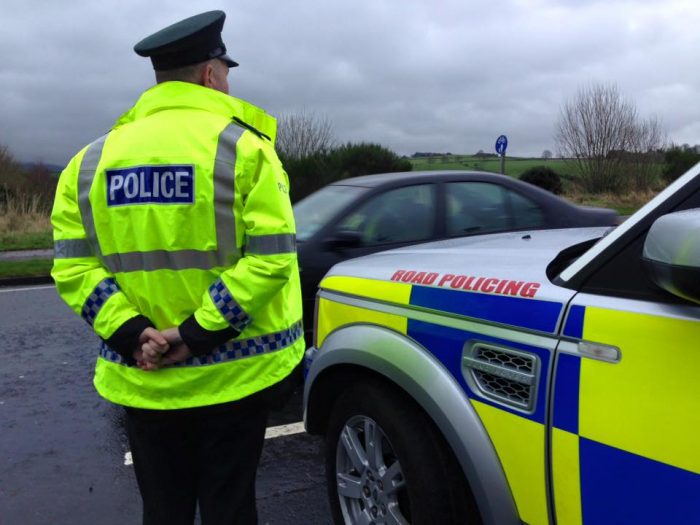
This man was given a clean bill of health to drive but others might not be so fortunate and could face a court and lose their licence if caught
Police say they plan to breathalyse more than 16,000 road users across the North his festive period as part of its festive crackdown.
Their winter campaign against the crime will feature targeted operations at day and night where they will team up with Garda traffic police to stop lawbreakers.
The main message from the operation is ‘What can you live without?’.
Assistant Chief Constable Alan Todd explained, “As 357 people detected during our winter operation last year discovered to their cost, everyday tasks they’d taken for granted became much more difficult as a result of losing their driving license.
“This year, we are asking the public some sobering questions; What can you live without?’ Can you live without your driving license? Can you still do your job? Can you still care for your family? If you take the risk of driving after drinking, you can expect to be detected by police. You can expect to be prosecuted and lose your driving license. If you cause a collision in which someone is killed or seriously injured, you can expect a custodial sentence.
“The stark reality is that so far this year, 52 families across Northern Ireland are coping with the death of loved one because of a road traffic collision. As a result, there are drivers having to come to terms with the fact that their actions have caused a fatal collision.”
The police operation, which runs from today through until 1 January, will once again feature road policing officers, local and neighbourhood policing teams working alongside TSG units across the country using legislation introduced in 2016, to set up authorised vehicle checkpoints and carrying out random breath tests as very visible, physical deterrent.
Over the coming weeks, targeted operations will run day and night, and Police will coordinate road safety operations in border counties with colleagues from An Garda Síochána Traffic Corp.
Assistant Chief Constable Todd continued, “Our message is clear. Never EVER drink and drive. Just one drink can impair decision making. Just one drink can cause a collision. Just one drink could kill.”
“We carried out nearly 16,000 preliminary roadside breath tests during last year’s operation – a 25% increase over the previous year. Our aim during this campaign is to test even more people, but have fewer detections.
“Any driver or motorcyclist stopped by police, whether for speeding, using a mobile phone, or committing any moving traffic offence can expect to be breathalysed.
“So too can anyone involved in a collision or who we suspect may have consumed alcohol or taken drugs.
“People going out to enjoy the festivities really need to put as much effort into planning how to get home safely, as they do planning their night out.
“Road users also need to make extra effort to look out for pedestrians who may have been drinking, in built up areas where they may suddenly step or fall into your path, or who may be walking along unlit rural roads during the hours of darkness.”
This year’s operation is also being supported by the independent charity Crimestoppers, which is urging the public to speak up against regular drink driving.
Sue Brew regional manager for Northern Ireland Crimestoppers said, “We want to help keep people safe on the roads this Christmas and New Year and urge anyone with information to speak up and tell us who is getting behind the wheel after drinking.
“Drink drivers put other people’s lives at risk and your information could help prevent a collision from happening and could even help save lives.
“We appreciate that if you’re close to someone who drives after drinking, it can be difficult to come forward. It could be a work colleague, a neighbour, a family member or a friend. This can explain why some people are reluctant to go to the police because of the fear of being identified.
“By trusting us with your information you’ll remain 100% anonymous. Always. We never take personal details and calls to our Contact Centre on 0800 555 111 and information passed through the Anonymous Online Form at www.crimestoppers-uk.org cannot be traced. Together we can help protect those you care about.”
 Assistant Chief Constable Todd concluded, “We all share the roads, so we all share the responsibility for road safety.
Assistant Chief Constable Todd concluded, “We all share the roads, so we all share the responsibility for road safety.
“Slow down.
“Never drive after drinking or taking drugs.
“Pay greater attention to your surroundings, and always wear your seat belt.
“If everyone follows this advice, then together we can save lives on our roads.”
Tags:




